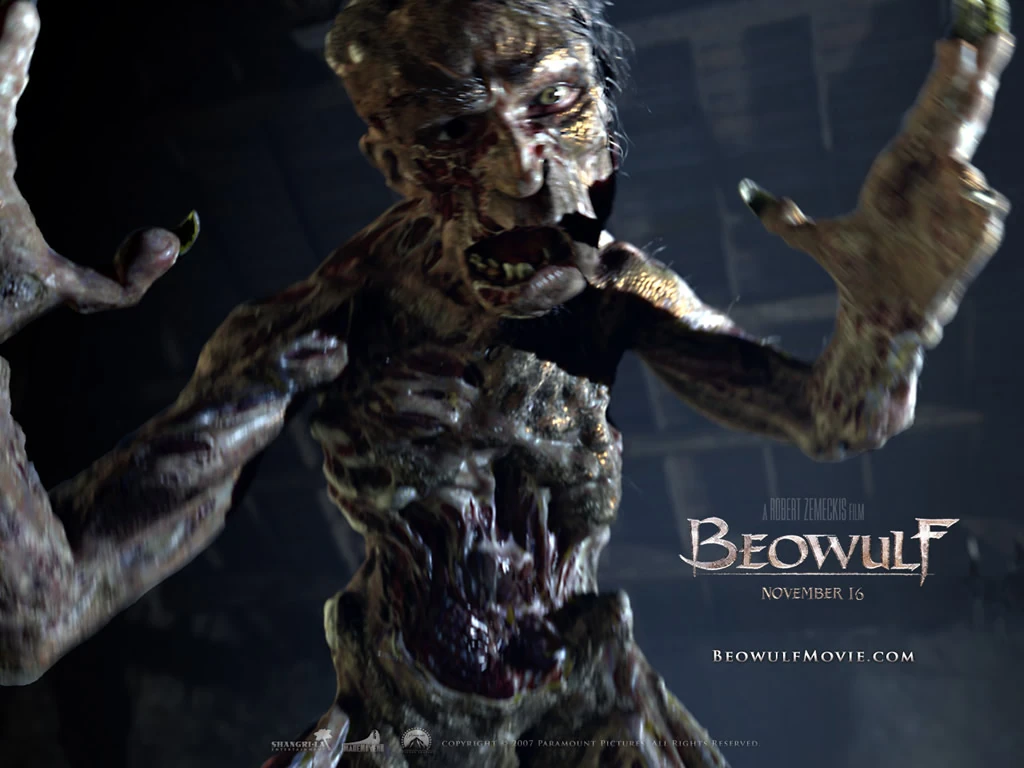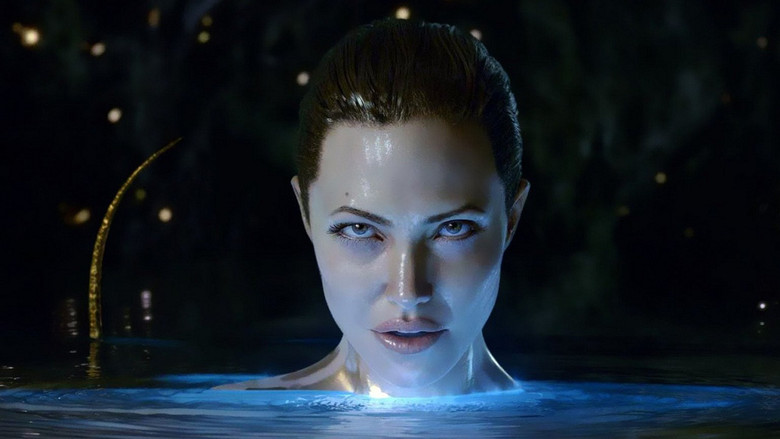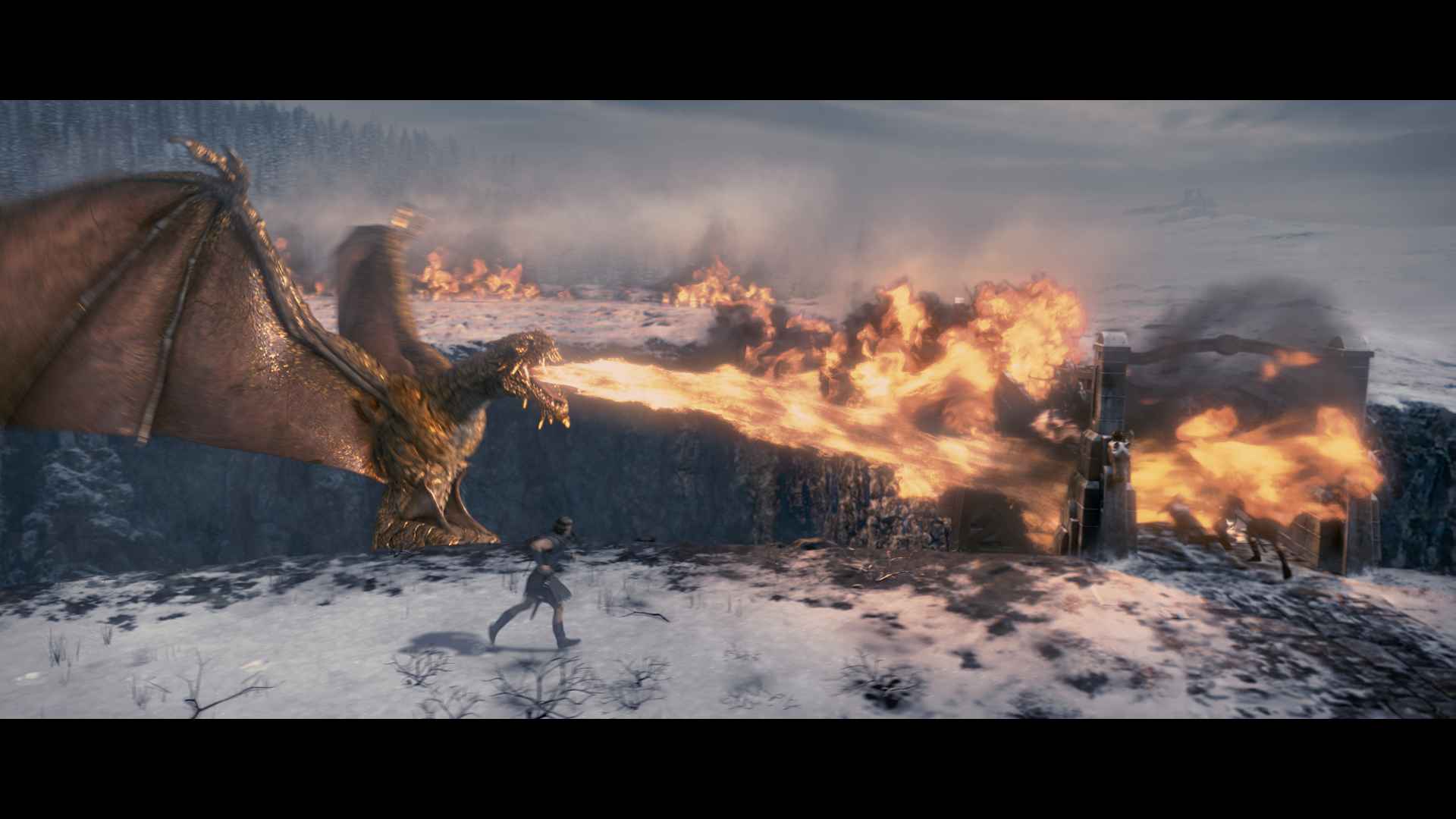Alas, a hero is sent, arriving on a Viking-esque boat in smooth (though sleeveless) metal armor. Beowulf pledges to the king, who is loosely robed in what appears to be a toga style gown. In an attempt to make Beowulf seem like a strong hero, he says he would die "...for glory, not for gold." But the viewer soon sees that Beowulf is not only brave, but is also selfish and anxious about how people view him (classic Gryffindor). When Unferth, a sniveling sort of man, confronts Beowulf about losing in a race, Beowulf explains that there were sea monsters, which he killed, that prevented him from going forward; however, he also claimed to have killed a mermaid, when he actually dropped the knife he was going to use to kill her, which is a bit of foreshadowing. So, he's desperate to show how brave he is, when in reality he is fallible.
 |
| Here is Grendel Attacking |
Honestly, I feel bad for Grendel; the main reason he kills is because loud noises hurt his head immensely, so when he's killing people, he's trying to get rid of the noise. At least, at first. Beowulf decides to have a raucous, boozy feast, with the intention of attracting Grendel to the mead hall. It works. A naked, presumably drunk Beowulf fights Grendel and defeats him by pulling his arm off with a chain. This, of course, angers Grendel's mother; in a dream, she disguises herself as Hrothgar's queen and tells Beowulf that she wants to have sex with him, then when Beowulf wakes up, all of the warriors he fought with the night before, who had survived the fight with Grendel, were dead and strung on the ceiling like salted meat. The warriors are burned on a pyre, and Beowulf is informed that if he kills Grendel's mother, who, from here on I'll just refer to as "mother," demon kind will disappear.
 |
| Mother disguised as the queen |
Here's where the movie starts to differ greatly from the original poem. In the poem, Beowulf travels in thick armor to kill a horrible, foul ogre of a mother, and almost dies while doing so, because she stabs him with a sword. In the movie, he strips down to his underwear and ends up not killing, but having sex with, a beautiful, lithe mother who greatly resembles Angelina Jolie. Strangely, we discover that Grendel was mother and Hrothgar's son. Though in the book, Beowulf returns to his homeland after killing mother, in the movie he is crowned king when Hrothgar commits suicide.
 |
| Mother, who is clearly not scary at all |
The movie jumps forward to when Beowulf is an old, depressed man. It shows Beowulf's people at war with another people; they fight hand to hand with classic shields and swords, but Beowulf isn't supposed to participate because he's the king. Beowulf is challenged by a young man to fight, and he accepts, taking off his armor and casting away his sword. The boy refuses to kill Beowulf when he is unprotected and unarmed, and Beowulf tells him to go home as a brave man. Then, a dragon (who happens to be Beowulf's son) terrorizes and kills an entire village, and a battered old man says the dragon did it because of the "sins of the fathers." In the story, the dragon is not Beowulf's son, seeking revenge on his powerful father, but is merely angry because someone stole some of his treasure. Beowulf defeats the dragon, but dies afterwards, admitting to Wiglaf that he lied about killing mother. And it ends! Now we venture on to what's really important.
While entertaining, there were some aspects of the film that were almost embarrassingly modernized. While I understand it would have been difficult to create a live action version of Beowulf, with it's monsters and dragons, the style of animation used in the film made the story seem distorted, and almost like a video game. Zemeckis also made odd changes to the character of Grendel's mother, who is described in the poem as a monster, like Grendel. In the movie, she is depicted as sexy and alluring, and is able to distract and seduce Beowulf and destroy his sword. I think this took away from Beowulf's status as an epic hero, as it made him seem fallible to simple pleasures like sex or beauty.
The movie, like the poem, did highlight several important Anglo-Saxon values and culture. For example, bravery and honor were mentioned heavily throughout the story. Though this differs from the original story, the warriors don't cower away from Grendel, but faced him bravely. Anglo-Saxons valued bravery very much, and it was expected in warriors, as they were who the rest of the people looked up to to protect them. Beowulf and the warriors showed their sense of honor through unquestioning service to the king and their treatment to each other. Even though Unferth didn't like Beowulf, he apologized for insulting him and assuming he was not a hero when Beowulf killed Grendel, which showed honor and courage. The movie also mentions several conflicting religions. As mentioned, the king, scared after Grendel's first attack, spoke of praying to a Roman god. When Beowulf killed Grendel, he praised Odin, and said that a curse had been lifted from him. An unnamed character in the movie later says "the Christ God has killed it..." in reference to a battle. This is fairly true to the time period in which it is set, as Christianity hadn't established itself as the main religion, and Norse mythology mingled with Roman religion.
In conclusion, don't watch this oddly animated film and expect to know truth about the Middle Ages. It seems obvious that there would be some ties to actual early Medieval life in the film, as it's based off of a story composed in that time period. But, in the same way you wouldn't look to stories like the Iliad for accurate history, I think it would be unwise to believe this movie is based on fact. There's just one too many dragons.
 |
| And here's a lovely picture of father and son |
Resources
Beowulf. (2007). Directed by R. Zemeckis. Paramount Pictures.
Rees, M. (2008). Beowulf: tenuous relationship between movie and poem. Wsws.org. https://www.wsws.org/en/articles/2008/03/beow-m01.html [Accessed 9 Sep. 2017].



I think that it is interesting that the director chose to make Grendel's mother seem appealing to Beowulf when she is described as hideous in the poem. The difference between movies and the actual text make some information lost in translation and I think that this is one of those times. Movies are not always good uses to get the best factual information.
ReplyDeleteGood detailed review. I agree Bayler!
ReplyDelete